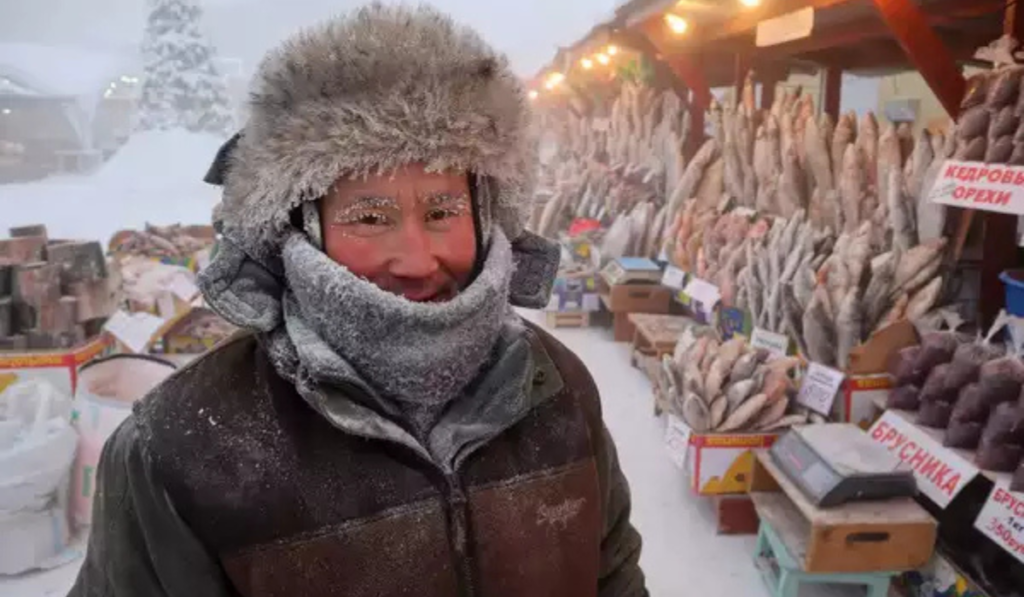Travel
Experience the Extreme Cold: A Journey to Yakutsk, the Coldest City in the World
Yakutsk, the capital of the Sakha Republic in Siberia, is not just cold; it’s the coldest city on Earth. With temperatures plunging to as low as -55°C (-67°F), this city offers a unique glimpse into how people adapt to such extreme conditions. This post explores daily life in Yakutsk and the resilience of its residents as they navigate living in a stunning icy environment.
Yakutsk’s Extreme Weather and Its Impact on Daily Life
Everyday Experiments with Extreme Cold
To highlight the intense cold, several experiments showcase Yakutsk’s weather.
- Boiling Water: When boiling water is thrown into the air, it instantly freezes into a mist.
- Frozen Clothing: A wet t-shirt left outside turns into ice in just five minutes.
- Noodles: Lifting a fork filled with instant noodles shows frost immediately wrapping around them.
These experiments illustrate the intense -41°C (-41.8°F) temperatures that locals face daily. Living in such cold transforms routine tasks into fascinating experiments.
Adapting to the Freeze
Yakutsk residents have developed unique strategies to cope with frigid temperatures:
- Heated Bus Stops: These allow waiting passengers to warm up during long waits.
- Car Practices: People leave their cars running to avoid freezing the engines, even at gas stations. This is due to the low cost of gasoline, around $0.76 per liter.
- “Natasha” Covers: Cars are shielded with winter awnings locally called “Natasha,” helping protect them from heavy snow and frost.
In construction, homes are built with gaps to preserve the permafrost beneath, showcasing a clever adaptation to the environment.
Transportation and Commerce in Sub-Zero Temperatures
Bicycles are a common sight, with locals using them for commuting and deliveries, even in bitter cold. The “Coldest Market in the World” is a destination where frozen fish and meat are sold.
- Chir Fish: This local delicacy is sold at about $20 per kilogram. The salespeople endure -41°C (-41.8°F) while showcasing their products.
- Working Conditions: These brave individuals navigate freezing temperatures daily, with frost sometimes forming on their eyelashes.
A Glimpse into Yakutsk’s Culture and People

The People of Yakutsk
The spirit of Yakutsk lies in its people. They go about their lives undeterred by the cold, showing remarkable resilience. Locals often greet the harsh weather with determination, demonstrating how their daily routines adapt to the climate.
Local Delicacies and Traditions
Dining in Yakutsk offers unique culinary experiences.
- Stroganina: A dish made from frozen Chir fish that diners savor in rich cultural settings.
- Culinary Traditions: Locals dress warmly, often in expensive furs like sable as a fashion statement amidst the cold.
Clothing and Staying Warm
Proper attire is essential. For protection against extreme temperatures, locals wear layered clothing:
- Two hats
- A warm scarf wrapped around the face
- Thick, insulated boots
Without proper gear, exposure to the cold can be dangerous.
Exploring Yakutsk’s Unique Landmarks and Sights
The City’s Skyline and Observation Deck
From the observation deck at 200 meters, views reveal a mystical city shrouded in fog, creating a dreamlike atmosphere. The icy landscape is breathtaking, merging natural beauty with urban living.
The Ethnographic Complex Chochur Muran
This cultural hub presents the rich heritage of the region. Visitors can try local foods like stroganina while learning about the traditions that shape Yakutsk’s identity.
A Walk Through Yakutsk’s Old City
Walking through Yakutsk’s old city, you experience its historical charm. Unique architecture stands prominently against the snow, while doormats and carpets help prevent slipping on icy steps. Each corner reflects the city’s deep-rooted culture.
Journey to Oymyakon: The Pole of Cold
The Journey to Oymyakon
Traveling to Oymyakon, about 914 kilometers (567 miles) from Yakutsk, offers insight into one of the coldest places on earth. The journey is challenging, emphasizing the harshness of this vast frozen landscape.
Experiencing the Coldest Place on Earth
In Oymyakon, temperatures can drop to -72°C (-97°F). The cold bites at your skin, reminding you just how extreme this environment is. The silence of the snow-covered land amplifies the sense of isolation.
Returning to Yakutsk
After visiting both Yakutsk and Oymyakon, the experience solidifies the understanding of human resilience. Despite the cold, life in these areas thrives with unique challenges that locals meet with strength and creativity.
Conclusion: Yakutsk’s Enduring Spirit
Yakutsk’s journey showcases the incredible ability of people to adapt and flourish in harsh climates. Life in this frigid city is a testament to human resilience and ingenuity.
For those seeking extraordinary cultural experiences and stunning landscapes, Yakutsk stands out as a must-visit location. Consider a trip to witness firsthand the wonders of the coldest city on Earth.
FAQs
Q1: How does the extreme cold affect daily life in Yakutsk?
A1: The severe temperatures transform routine activities into extraordinary experiments—boiling water instantly freezes, clothing turns to ice, and even simple tasks like riding a bicycle require special adaptations.
Q2: What are some unique adaptations used by Yakutsk residents?
A2: Locals use heated bus stops, leave their cars running to prevent engine freeze, and shield vehicles with “Natasha” covers. Buildings are constructed with gaps to protect permafrost, showcasing clever, environment-specific designs.
Q3: What are the key cultural highlights of Yakutsk?
A3: Yakutsk offers a rich cultural experience, from traditional dishes like stroganina to historic landmarks like the Chochur Muran Ethnographic Complex and unique architecture in the old city.
Q4: What makes the journey to Oymyakon special?
A4: Traveling to Oymyakon—a region where temperatures can reach -72°C (-97°F)—provides a firsthand experience of extreme cold and highlights the resilience required to thrive in such harsh conditions.
Q5: Why is Yakutsk considered a unique travel destination?
A5: Beyond its record-breaking low temperatures, Yakutsk offers a captivating blend of natural beauty, innovative adaptations, rich cultural heritage, and the inspiring spirit of its residents, making it a must-visit for adventurous travelers.